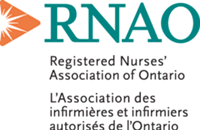RNAO will press for alternatives to solitary confinement in upcoming provincial review on prison segregation
TORONTO, March 27, 2015 /CNW/ - Ontario's nurses welcome the upcoming comprehensive review of segregation policies at the province's prisons, and are hopeful for changes that respect the human rights of incarcerated Ontarians.
Minister of Community Safety and Correctional Services Yasir Naqvi's commitment Thursday to improve conditions for Ontario's incarcerated population – particularly those with mental health issues – is encouraging, says the Registered Nurses' Association of Ontario (RNAO).
"Minister Naqvi's commitment is an important step toward improving a correctional system that has failed too many Ontarians," says RNAO CEO Doris Grinspun, who recently met with Naqvi to urge for changes.
"The world is moving away from the use of solitary confinement, and Ontario has an opportunity to take the lead nationally on this issue." Grinspun says, noting that the federal government has refused to review this harmful practice. "Solitary confinement erodes health, and is particularly dangerous for inmates that are already suffering with serious mental illness."
RNAO says there are lessons to be learned from the tragic death of 19-year-old Ashley Smith, who committed suicide under the watch of federal prison guards, and from Christina Jahn, who was kept in solitary confinement for more than 200 days while in Ontario's custody, despite having cancer and mental illness. Experiences like these sparked the Ministry of Community Safety and Correctional Services (MCSCS) to commission a report exploring access to mental health services for female inmates. On Thursday, the MCSCS released recommendations from this report and announced it would also be reviewing the province's solitary confinement policies.
In January, RNAO sent a letter to Minister Naqvi with recommendations to bring Ontario's correctional system in line with international human rights laws. These recommendations included reducing overcrowding, increasing capacity for treating mental illness in prisons, and abolishing solitary confinement for persons with serious or acute mental illness. Using solitary confinement only rarely as a last resort and with appropriate safeguards, instead of routinely as a staffing workaround, would be consistent with the United Nations call to Canada for action on this issue.
The ministry will begin consultations with mental health experts and other stakeholders in the summer. Ontario's nurses will join these consultations and collaborate with the government to help create a healthier correctional system, says RNAO President Vanessa Burkoski.
"About 700 correctional nurses across the province work closely with incarcerated Ontarians every day," says Burkoski. "These nurses and others who work closely with this population in regions across the province can provide a vital health-care perspective to better address the complex needs of a vulnerable group."
This year marks the Registered Nurses' Association of Ontario's (RNAO) 90th anniversary. RNAO is the professional association representing registered nurses, nurse practitioners, and nursing students in Ontario. Since 1925, RNAO has advocated for healthy public policy, promoted excellence in nursing practice, increased nurses' contribution to shaping the health-care system, and influenced decisions that affect nurses and the public they serve. For more information about RNAO, visit our website at RNAO.ca or follow us on Facebook and Twitter.
SOURCE Registered Nurses' Association of Ontario

Daniel Punch, Communications Officer/Writer, RNAO, Tel: 416-408-5606 / 1-800-268-7199, ext. 250, [email protected]

Share this article